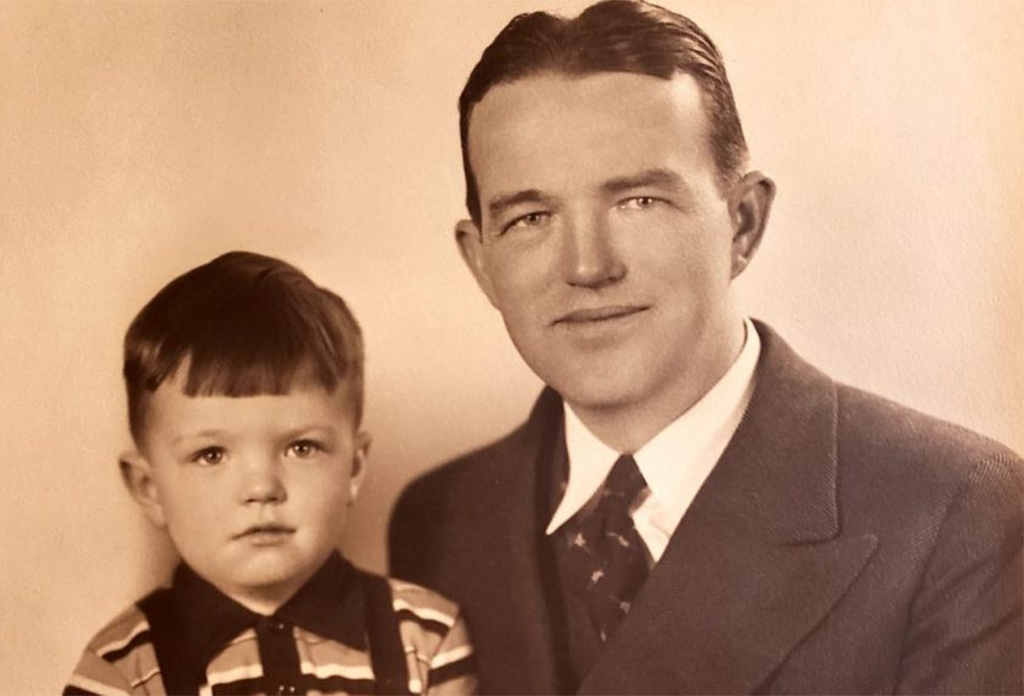‘Cambridge Love Letters’ set for June 8 reading include parental, romantic and the (color) purple

Lt. Commander John J. Shea of the U.S. Navy’s USS Wasp and his son, Jackie, in Cambridge before World War II. (Photo: History Cambridge)
What is it about love letters? What makes a person feel moved to write one? What – or who – inspires such passion and poetry? One thing is for sure: There’s something magical about them. We at History Cambridge are capturing that magic in our upcoming event, “Cambridge Love Letters,” from the stage at Starlight Square at 7 p.m. Tuesday and again Aug. 10.
Program director Beth Folsom has been fielding submissions for the event, reading through scores of love letters in her quest to curate a most compelling collection to share with the “Cambridge Love Letters” audience. What caught her eye most was the diversity of submissions. People were sending their romantic musings, but also their love for the places and institutions of Cambridge.
“People have taken this theme and run with it in so many different ways,” Folsom said. “The pandemic has made people hyper-local. They’re depending on people around them in new and different ways. They seem to have this new appreciation for the people and institutions around them.”
Submissions range from classic love letters to a love letter about Cambridge Rindge and Latin basketball to an ode to the purple houses of Cambridge to a whole slew of love letters from the third-graders of the Amigos School. One of the most moving pieces was a letter from Cambridge’s Lt. Commander John J. Shea to his son from the battlefields of World War II. This letter, widely published just after Shea went missing in action and was declared dead in 1942, illustrates his pride in his young son and passes on advice in the event he does not return from the war.
“This is the first letter I have ever written directly to my little son and I am thrilled to know that you can read it all by yourself. If you miss some of the words, I’m sure it will be because I do not write very plainly. Mother will help you in that case I am sure,” he writes. Toward the end of his letter, he continues: “If I don’t get back, you will have to be Mother’s protector because you will be the only one she has. You must grow up to take my place as well as your own in her life and heart.”

Some of Shea’s letter to his son. (Image: History Cambridge collection)
This letter is just one example of love here in Cambridge that lives in all of us. Tuesday at 7 p.m., join us for “Cambridge Love Letters” – to people, places and the city itself – from the stage at Starlight Square. This performance will feature letters past and present, drawn from the attics and basements and long-kept diaries of Cambridge lovers just like you. We are thrilled to be joined by members of Improv Boston, who will help bring our selections to life. Come experience the joy, the angst and the hilarity – have your tissues ready for this emotional evening. Get your free tickets now!
![]()
About History Cambridge
History Cambridge started in 1905 as the Cambridge Historical Society. Today we have a new name, a new look and a whole new mission.
We engage with our city to explore how the past influences the present to shape a better future. We strive to be the most relevant and responsive historical voice in Cambridge. We do that by recognizing that every person in our city knows something about Cambridge’s history, and their knowledge matters. We support people in sharing history with each other – and weaving their knowledge together – by offering them the floor, the mic, the platform. We shed light where historical perspectives are needed. We listen to our community. We live by the ideal that history belongs to everyone.
Our theme for 2021 is “How Does Cambridge Mend?” Make history with us at cambridgehistory.org.
Amy Marquis is communications director of History Cambridge.


